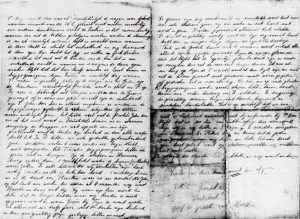The April 6, 1943 transport had only two survivors: Selma Wijnberg and Ursula Stern. In addition to their testimonies, there is also the letter from Levie Sluijzer. A first-hand account of the journey from Westerbork to Sobibor.

The preserved letter from Levie Sluijzer
Levie Sluijzer was deported from Westerbork to Sobibor on April 6, 1943. He agreed with his remaining brother to hide a bill at the bottom of his wagon. The brothers knew that the same trains went back and forth. Brother Mozes survived the war and kept the staggering first-hand account. Jules Schelvis’ book Sobibor Extermination Camp describes this history in detail. The original bill is part of the Westerbork Archive (Coll. 250i – inv. no. 1075) of the NIOD Institute for War, Holocaust and Genocide Studies.
Transcription:
First day of the trip was already terrible. The wagon was chock full. When someone had to use the toilet, he had to climb over others. It is especially difficult for the sick when they have to be helped out of the beds. The mood is already terrible, everyone is bitching and arguing. When the door is closed, it stinks terribly and is very stuffy. The door open, then it is very drafty. We are in pitch darkness. At night the cold is unbearable. It’s a dire night and when we open the door in the morning we find that it is the heart of winter here. first we encounter prisoners of war. Russians waving friendly hello. Nature is beautiful. Later in the morning we see Jews on the tramway. Probably Polish because it has a P on it. They look decent. In the morning, the Green asks if some of them may have been sprained and indeed, two Jews died of cold and misery. They are placed in the baggage car. They are seemingly counting on deaths. But on the other hand, given the light work the Polish Jews do I don’t see it as black. By now we are getting into warmer surroundings and snapping a bit. Many of us are ragged because the benches are rock hard and through all the seams it draughts. In Germany we have seen many sections bombed, and endless pastures but without cattle. Day and night is driven on.
Many French prisoners of war we saw, including in camps. At the station in Hanover, each train was given a milk kettle of water. The porters (witkiels) were Jews. The many clothes we have on are much needed, because at night it is very cold. In the afternoon we come near Breslau where we see some Dutch Jews working in the fields. They had been gone for nine months, as Broeks is among them. They pointed at their mouths in sign that they were hungry but we couldn’t throw anything at them because there were Greens with them. By evening we were all getting a little groggy because the couches were rock hard and hurt us tremendously. We did not sleep. The Greens are very obliging and friendly. Not so bad. At the many stations they give us water and also bread with sausage and jam. Passed Breslau. All bare plains. The night is fortunately over because they are bad. Over all comes draughts and nowhere to sleep. We are all exhausted. Yet the Jewish humor cannot be beat, for despite all the misery, jokes are made.
By morning we are at a standstill. It seems the rail lines have been bombed and we have to detour, so the journey will take much longer. I look forward to the third night like a mountain because all this time we have not been out of our clothes, not washed, not eaten or drunk anything hot. It is more like bad. We now see prisoners of war soaking in many places like stone chipping, pushing carts and so on led by German soldiers. The scenery is beautiful, huge mountains covered with forests and endless expanses of land. It is remarkable that we see so few people and livestock at all. By the way, Poland looks completely shabby. Information from Polish farmer reveals that we are 100 kilometers from Lublin, so tonight we will be there. It took us 3 days and 2 nights, a blood journey. The Polish farmer said the Jews were shot. We hope for a better fate. Didn’t suffer from thirst because at the stations we were allowed to fill milk cans with water.
PS: stop with those cards for parcels, is fake, because we got nothing. Finder of this letter should hand it in.
M.S. Barracks 69 Westerbork. Give greetings to Mother.


